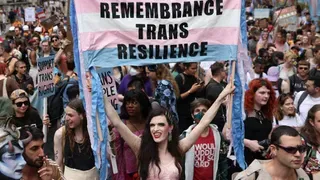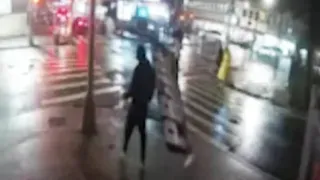January 28, 2011
Transgender woman found dead inside Minneapolis apartment
Joseph Erbentraut READ TIME: 4 MIN.
Though Krissy Bates had only lived in Minneapolis for only four months before her Jan. 6 death-the Twin Cities' first homicide of the year and the first murder of a transgender person in Minnesota in nearly 15 years, the few people who knew her had only kind words for her. They described the former Kentucky resident as a true Southern belle: outgoing, talkative, friendly and hospitable.
Judging by the crowd of nearly 300 who braved freezing cold temperatures last Friday to pay their respects to Bates at a vigil in downtown Minneapolis, the Twin Cities' trans residents are unlikely to forget her tragic death anytime soon. Authorities have charged Arnold Darwin Waukazo, who claims he had been dating Bates, with her murder. A broader sense of justice, however, will not be so easily achieved for trans Minnesotans, their friends and supporters.
Bates was reportedly found dead in her Minneapolis apartment on Jan. 10 after her friend asked her complex's management to check on her. They called the police after Bates was found on the floor with apparent stab wounds in her torso and neck.
The Minneapolis Police Department launched an investigation into the apparent homicide and charged Waukazo, who had fled to nearby Blaine, Minn., with felony second-degree murder on Jan. 21. According to the police report, Waukazo had met Bates through a Craigslist personal ad. He and Bates began to argue and he strangled her before stabbing her five times and also breaking several of her ribs. Waukazo could face up to 40 years in prison if he is found guilty.
Barbara Satin, a Twin Cities-based activist who works with the National Gay and Lesbian Task Force and organizes the area's annual Transgender Day of Remembrance, said local trans residents have responded to Bates' death with both sadness and anger.
Minneapolis passed one of the country's first trans-inclusive human rights ordinances. And Satin said the tragedy has resulted in a somewhat unfamiliar sense of vulnerability for trans people who live in the Twin Cities.
"It's not something that has been on the forefront of peoples' minds; It's become pretty comfortable for a lot of the transgender community to feel safe and secure and then something like this comes and shakes us to our roots," said Satin. "Krissy was somebody who walked the same streets we do, breathed the same air and probably was in the same places we were too."
As is typical in these tragedies, some mainstream media outlets reported Bates' birth name in their story and inaccurately used male pronouns to refer to her. The MPD, on the other hand, has been largely respectful of Bates' gender identity. The Transgender Youth Support Network has launched a letter-writing campaign to address transphobia in the media. And trans activists are also working to expand their relationship with the MPD and perhaps create an LGBT liaison team within the force.
Bates' death highlights plight of many trans Americans
As details slowly emerge about Bates' life, her story reflects many of the harsh realities trans people in Minnesota and across the country continue to face. A City Pages article reported Bates may have been engaging in sex work to earn a living-a detail some mainstream media outlets appear to have used to sensationalize the story.
Michael Silverman, executive director of the Transgender Legal Defense and Education Fund, said Bates' murder suggests she, like so many trans people, was "living a life on the margins" with few career and housing options. Without a trans-inclusive federal Employment Non-Discrimination Act, adequate employment opportunities remain out of reach for some trans Americans.
"Even in progressive places like Minnesota where things seem to be going well, we're still finding transgender people living far from the mainstream and on the far margins of society in lots of ways," said Silverman. "A robust, trans-inclusive ENDA would go a long way in protecting transgender people in the workplace, which would bring far more trans people into workplaces and out of situations like the one it appears Krissy was in."
Rebecca Waggoner, anti-violence program director for OutFront Minnesota, which organized Bates' vigil, said the tragedy offers a long overdue opportunity to address domestic and intimate partner violence in same-sex relationships. She stressed this case also highlights safety concerns that remain for trans people and LGBT youth-the number of Minnesota students who have recently taken their own lives has drawn attention to what activists describe as an alarming rate of anti-LGBT harassment.
Waggoner described Bates' legacy as "a gift of light" to shine on issues the broader LGBT movement can no longer ignore.
"I think people have started to use Krissy as a rallying point of 'Never again,'" she said. "The call has gone out to organize and stand in solidarity between all of our LGBT communities and find ways to create common ground in creating the strongest, safest Minnesota possible. If we don't, people aren't going to come out and aren't going to live diverse, creative, supported lives."
While reliable data on anti-trans violence can be difficult to track, the National Coalition of Anti-Violence Programs' most recent report found trans women in particular experience disproportionately high levels of violence, accounting for more than half LGBT bias-related murders in 2009.
Joseph covers news, arts and entertainment and lives in Chicago. He is the assistant Chicago editor for The Huffington Post. Log on to www.joe-erbentraut.com to read more of his work.







